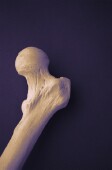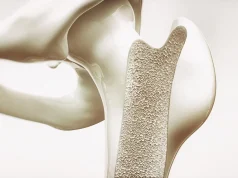No significant effect of diet-induced weight loss on lumbar spine or whole body bone mineral density
MONDAY, June 1, 2015 (HealthDay News) — Diet-induced weight loss is associated with a decrease in total hip, but not lumbar spine, bone mineral density (BMD), according to a review published online May 25 in the Journal of Bone and Mineral Research.
Jessica Zibellini, from the University of Sydney, and colleagues conducted a systematic review and meta-analysis to quantify the effect of diet-induced weight loss on bone. Data were included from 41 publications involving overweight or obese but otherwise healthy adults.
The researchers found that for interventions of six, 12, and 24 months’ duration, diet-induced weight loss correlated with significant decreases of 0.010 to 0.015 g/cm² in total hip BMD. For interventions of three to 24 months’ duration, there was no significant effect of diet-induced weight loss on lumbar spine or whole body BMD, although there was a significant decrease in total body BMD after six months (−0.011 g/cm²). There was no significant change in serum concentrations of N-terminal propeptide of type I procollagen; significant increases were seen in serum concentrations of osteocalcin, C-terminal telopeptide of type I collagen, and N-terminal telopeptide of type I collagen with interventions of two or three months in duration.
“These data show that in overweight and obese individuals, a single diet-induced weight loss intervention induces a small decrease in total hip BMD, but not lumbar spine BMD,” the authors write.
One author disclosed financial ties to the pharmaceutical industry.
Copyright © 2015 HealthDay. All rights reserved.








